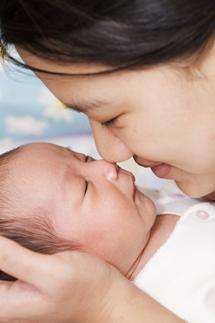Parental instinct found in the brain

A possible basis for parental instinct has been found in the brain, according to a team led by Oxford University scientists.
A report of the team’s research, published in the open-access journal PLoS One, describes how a region of the human brain called the medial orbitofrontal cortex rapidly responds to the faces of unfamiliar infants but not to the faces of unfamiliar adults. The medial orbitofrontal cortex is located in the front of the brain, just over the eyeballs: it is a key region of the emotional brain and appears to monitor reward-related stimuli in the environment.
‘What we found was that the medial orbitofrontal cortex shows high activity within a seventh of a second of a person seeing an infant face but not an adult one,’ said Dr Morten Kringelbach of Oxford’s Department of Psychiatry, who led the work with Professor Alan Stein. ‘These responses are almost certainly too fast to be consciously controlled and so are probably instinctive.’
The finding could have important implications for approaches to postnatal depression, which affects approximately 13% of mothers in the UK. Depression has been linked to changed activity in the nearby subgenual cingulate cortex which is strongly connected with the medial orbitofrontal cortex. This lends support to the possibility that changes to activity in the medial orbitofrontal cortex secondary to depression may adversely affect parental responsivity.
The researchers used a neuroimaging method called magnetoencephalography at Aston University to observe the brain activity of volunteers as they pressed a button as soon as an on-screen cross changed colour. Images of infant and adult faces, interspersed between these colour changes and not important to completing the task, were briefly shown for a third of a second.
‘What our experiment revealed was that the medial orbitofrontal cortex may provide the necessary emotional tagging of infant faces as special and plays a key role in establishing the parental bond,’ said Professor Alan Stein. ‘Further research could identify whether the responses to infant faces we have observed are affected – and even dampened – by depression.’
The researchers hope that the results could eventually help health professionals to develop interventions to help vulnerable parents.
Source: University of Oxford




















